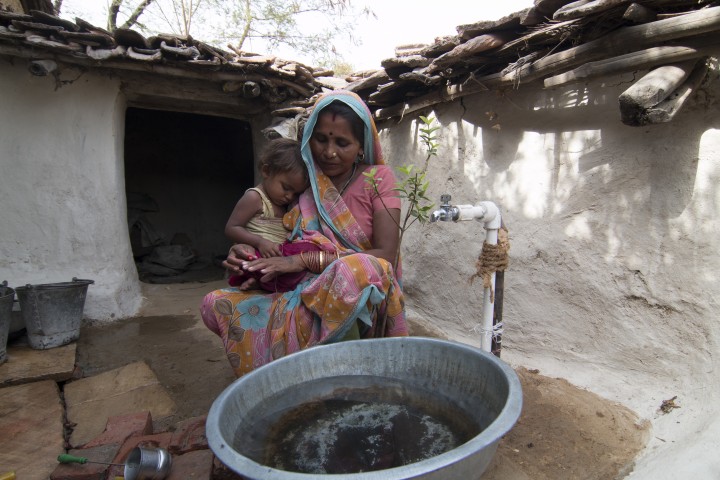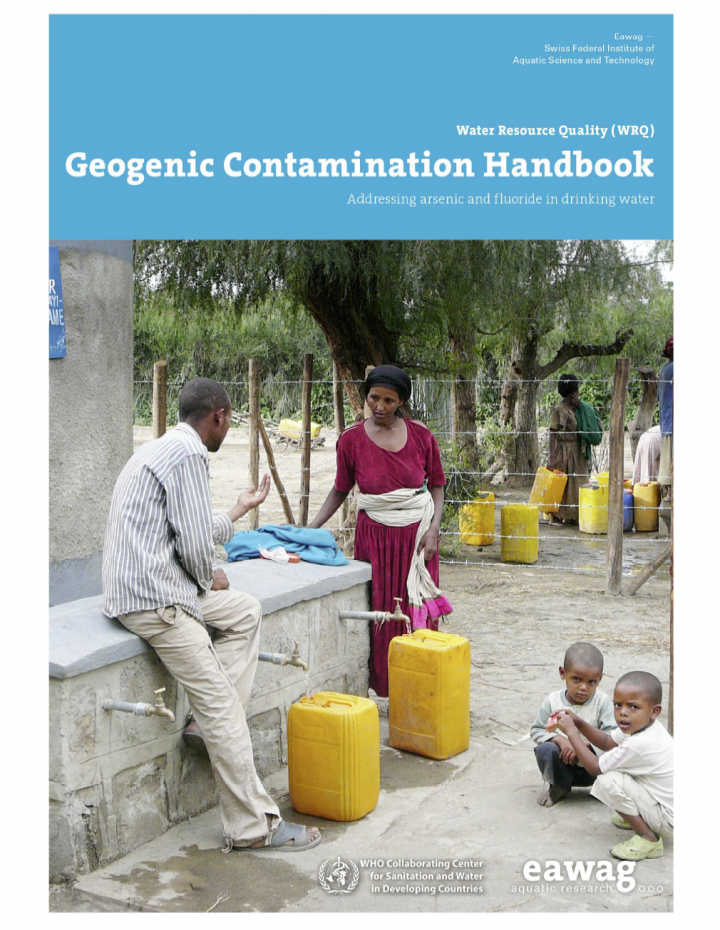Jacob, N., Shiva, R., and Saha, S. (2021) Celebrating women’s leadership in WASH during the COVID-19 Pandemic
The COVID-19 pandemic has affected women more than men in several ways, according to studies. They have had to take care of patients while coping with lock-downs that have restricted access to daily necessities and basic services, including water, sanitation and hygiene. At the same time, however, women have shown great strength and leader-ship in managing the uncertainties and challenges unleashed by this crisis. To celebrate […]
UNICEF Maharashtra and Water.org (2021) An Ecosystem for WASH Microlending in India
This field note provides an overview of the WASH and health financing project that is being implemented in the state of Maharashtra, India – The Ecosystem Approach. The project integrates WASH behaviour change communication (BCC) with rural household microlending programs to drive household water and sanitation access through loans. This initiative aims to establish open defecation free (ODF) communities supporting the larger national programme, the […]
Global WASH Cluster (2016) Cash and Markets In The WASH Sector A Global WASH Cluster Position Paper
Market based programming is increasingly heralded as having a critical place in the future of humanitarian programming. The proposed benefits of working through existing market systems include improvements to speed, efficiency and effectiveness of programming and increased beneficiary dignity and choice. Advocates for market based approaches claim that, where feasible, they promote economic recovery, resilience, acceptance and sustainability. This paper seeks to: locate CTP within the […]
Eawag (2017) Geogenic Contamination Handbook Addressing Arsenic and Fluoride in Drinking Water
This handbook focuses on the requirements of the implementer. It aims to provide a concise resource for approaching and handling geogenic contamination (primarily arsenic and fluoride) in groundwater used for drinking and cooking purposes. It providesinformation on water quality testing, different treatment options and practical guidelines, including draft questionnaires, on the integration of technical, institutional and sociological aspects of the problem. It aim is to […]
Driscoll, F.G. (1986) Groundwater and Wells A comprehensive study of groundwater and the technologies used to locate, extract, treat, and protect this resource.
A comprehensive study of groundwater and the technologies used to locate, extract, treat, and protect this resource
Davis, J., Lambert, R. (2002) Engineering in ermergencies A practical guide for relief workers
The purpose of this book is to increase the effectiveness of relief works in providing humanitarian assistance during an emergency. To achieve this purpose, the book provides practical information relevant to the field workers, with a minimum of supporting theoretical background. The book does not aim to set out specific policy guidelines relating to humanitarian assistance- each agency will have its own policy framework, principles […]
UNICEF, WaterAid (2021) Menstrual Hygiene in Schools in South Asia Country Snapshots
The Menstrual Hygiene in Schools in South Asia - Country Snapshots from UNICEF and WaterAid is divided into an 2018-2020 update including Key Observations, a country specific WASH in Schools (WinS) overview, a country specific MH Overview as well as the MH Journey in the countries Afghanistan, Bangladesh, Bhutan, India, Maldives, Nepal, Pakistan and Sri Lanka.
Branz, A. et.al (2017) Chlorination of drinking water in emergencies: a review of knowledge to develop recommendations for implementation and research needed
Clean water provision is a critical component of emergency response, and chlorination is widely used in emergencies to treat water. To provide responders with practical, evidencebased recommendations for implementing chlorination programmes and recommend areas for future research, we conducted a literature review of chlorination in emergencies, supplemented with a literature review on chlorination in general. We identified 106 total documents, including 7 with information on […]
Cavill, S., Mahon, T., Lihemo, G. (2021) Menstrual Hygiene in South Asia Synthesis Report
This report provides a summary of the status of menstrual hygiene (MH) in schools in South Asia. It describes the context for MH in schools and progress in the implementation of MH services since 2018. It identifies progress and gaps in achieving sustainable and inclusive MH services in schools at scale. It draws together opportunities for further promoting and mainstreaming MH in schools in South […]
WaterAid India (2021) Best practices to fight COVID-19 by panchayats
This is a collection of shorts of best practices from around the country that illustrate how panchayats have managed the COVID-19 pandemic.
IASC (2019) Inclusion of Persons with Disabilities in Humanitarian Action Guidelines
The guidelines set out essential actions that humanitarian actors must take in order to effectively identify and respond to the needs and rights of persons with disabilities who are most at risk of being left behind in humanitarian settings. The recommended actions in each chapter place persons with disabilities at the centre of humanitarian action, both as actors and as members of affected populations. They are […]
IFRC, Humanity & Inclusion, CBM (2015) All Under One Roof: Disability-Inclusive Shelter and Settlements in Emergencies
Persons with disabilities often experience discrimination and exclusion, despite the adoption of an increasingly rights-based approach to humanitarian assistance. The past three decades have witnessed a growing awareness of disability issues and the emergence and spread of disabled people’s organisations. The growing awareness must be accompanied by practical measures to identify and reduce the barriers faced by persons with disabilities in an emergency situation. The the capacity […]
Jones, H., Reed, B. (2005) Water and Sanitation for Disabled People and Other Vulnerable Groups Report of Conference and Workshop in Cambodia
The one day Conference held on 9th March 2006 was entitled “Water and sanitation for disabled people and other vulnerable groups: improving access and inclusion.” The purpose of the conference was to introduce the issues and problems of accessing and using WATSAN services and facilities for disabled people and other vulnerable groups, including solutions and examples of good practice for making WATSAN facilities more accessible […]
Jones, H., Wilbur, J. (2014) Compendium of Accessible WASH Technologies
This compendium presents low-cost technologies to improve the accessibility of household water, sanitation and hygiene (WASH) facilities. It is designed for use by people working directly with communities in rural areas of Sub-Saharan Africa, including health workers and community volunteers. Most of the ideas are designed to ensure access for disabled and older people, but are suitable for anyone who may have difficulty using standard facilities. […]
Jordan, T.D. (1980) A Handbook of Gravity-Flow Water Systems
A reference manual for surveying, designing, and constructing gravity-flow water systems, with special reference to such projects as implemented by the Local Development Department of His Majesty's Government of Nepal
Juillard, H., Sloane, E. (2016) Revised Pre-Crisis Market Analysis (PCMA)
This document provides guidance for practitioners on conducting market analysis before the onset of an anticipated crisis using an adaptation of existing post-crisis market assessment tools. Recommendations stemming from this analysis could be used to inform preparedness and DRR programming decision making as well as future emergency responses. This guidance focuses on markets, with the objective to improve programming. As with any humanitarian initiative, the […]
Kapranis, Y. (1999) Design of an Emergency Portable Roughing Filter using Polystyrene Beads as Media
Roughing filtration is a simple, efficient and chemical free water treatment method for turbidity removal; it can be used as a pre-treatment method prior to slow sand filters or disinfection with chlorine. The main disadvantage of roughing filtration for use in emergency situations is that it uses gravel as a filter medium. Gravel may be unavailable or difficult to transport because of its weight. [Continues.]
Kazadi, J., Kleemeier, E. (2011) Mobile Phones and Water Point Mapping
Several software applications incorporate recent advances in information and communication technology (ICT) to improve information gathering about water points. Among these applications, FLOW (Field Level Operations Watch) is not able because it was developed specifically for water point mapping. With FLOW, enumerators use android phones to enter data about each water point, and take its picture and Global Positioning System (GPS) coordinates. The data can […]
Keener, S., Luengo, M., Banerjee, S. (2010) Provision of Water to the Poor in Africa Provision of Water to the Poor in Africa
Standpipes that dispense water from utilities are the most common alternatives to piped water connections for poor customers in the cities of Sub-Saharan Africa. Fifty-five percent of the unconnected urban population relies on standpipes as their first water source. Other informal water providers include household resellers and a variety of water tankers and vendors, which are the first water source of 1 percent and 3 […]
Kjellén, M. and Mcgranahan, G. (2006) Informal Water Vendors and the Urban Poor
Water vending is probably as old as human society and trade, but in recent centuries it has been overshadowed by the expansion of networked piped systems. Water vending is now often taken as a symptom of a failure in these piped systems, which still provide water to only a minority of urban dwellers in many parts of the world. When collecting international statistics on access […]




















